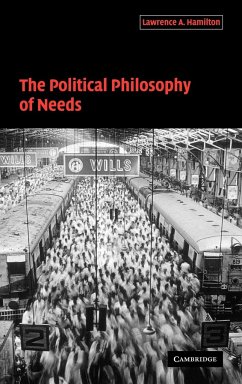Argues for the rehabilitation of 'human needs' as central to politics and political theory.
This ambitious and lively book argues for a rehabilitation of the concept of 'human needs' as central to politics and political theory. Contemporary political philosophy has focused on issues of justice and welfare to the exclusion of the important issues of political participation, democratic sovereignty, and the satisfaction of human needs, and this has had a deleterious effect on political practice. Lawrence Hamilton develops a compelling positive conception of human needs: the evaluation of needs must be located within a more general analysis of institutions, but can in turn help to justify forms of coercive authority that are directed toward the transformation of political and social institutions and practices. His argument is animated throughout by provocative and original discussions of topics such as autonomy, recognition, rights, civil society, liberalism and democracy, and will interest a wide range of readers in political and social philosophy, political theory, law, development and policy.
Table of content:
Preface; Introduction; 1. Liberalism's rights-preferences couple; 2. Beyond the rights-preferences couple; 3. The form and outline of the argument; Part I. The Nature of Needs: 4. Need categories; 5. Vital needs; 6. Particular social needs; 7. Agency needs; 8. The natures of needs: historical, normative, political; Part II. The Formation and Interpretation of Needs: 9. Generation and legitimation; 10. Normative power and the institution of private property; 11. Perception and interpretation; 12. Oppression and need; 13. True interests; 14. The concepts of true interest; Part III. The Political Evaluation of Needs: 15. Freedom and rights: a critique of the concept of 'civil society'; 16. Practices, institutions, and the evaluation of institutions; 17. Roles: reclaiming the census; 18. Practical reason and practical imperatives; Part IV. The State of Needs: 19. The state; 20. The modern state, coercion and power; 21. The state as ultimate evaluator and guarantor for meeting needs; 22. Need priority: practical not theoretical; 23. Political participation: procedural and institutional proposals; 24. Legitimacy and paternalism; 25. States of needs; Conclusion: What needs to be done? The case of South Africa; Bibliography; Index.
Hinweis: Dieser Artikel kann nur an eine deutsche Lieferadresse ausgeliefert werden.
This ambitious and lively book argues for a rehabilitation of the concept of 'human needs' as central to politics and political theory. Contemporary political philosophy has focused on issues of justice and welfare to the exclusion of the important issues of political participation, democratic sovereignty, and the satisfaction of human needs, and this has had a deleterious effect on political practice. Lawrence Hamilton develops a compelling positive conception of human needs: the evaluation of needs must be located within a more general analysis of institutions, but can in turn help to justify forms of coercive authority that are directed toward the transformation of political and social institutions and practices. His argument is animated throughout by provocative and original discussions of topics such as autonomy, recognition, rights, civil society, liberalism and democracy, and will interest a wide range of readers in political and social philosophy, political theory, law, development and policy.
Table of content:
Preface; Introduction; 1. Liberalism's rights-preferences couple; 2. Beyond the rights-preferences couple; 3. The form and outline of the argument; Part I. The Nature of Needs: 4. Need categories; 5. Vital needs; 6. Particular social needs; 7. Agency needs; 8. The natures of needs: historical, normative, political; Part II. The Formation and Interpretation of Needs: 9. Generation and legitimation; 10. Normative power and the institution of private property; 11. Perception and interpretation; 12. Oppression and need; 13. True interests; 14. The concepts of true interest; Part III. The Political Evaluation of Needs: 15. Freedom and rights: a critique of the concept of 'civil society'; 16. Practices, institutions, and the evaluation of institutions; 17. Roles: reclaiming the census; 18. Practical reason and practical imperatives; Part IV. The State of Needs: 19. The state; 20. The modern state, coercion and power; 21. The state as ultimate evaluator and guarantor for meeting needs; 22. Need priority: practical not theoretical; 23. Political participation: procedural and institutional proposals; 24. Legitimacy and paternalism; 25. States of needs; Conclusion: What needs to be done? The case of South Africa; Bibliography; Index.
Hinweis: Dieser Artikel kann nur an eine deutsche Lieferadresse ausgeliefert werden.







